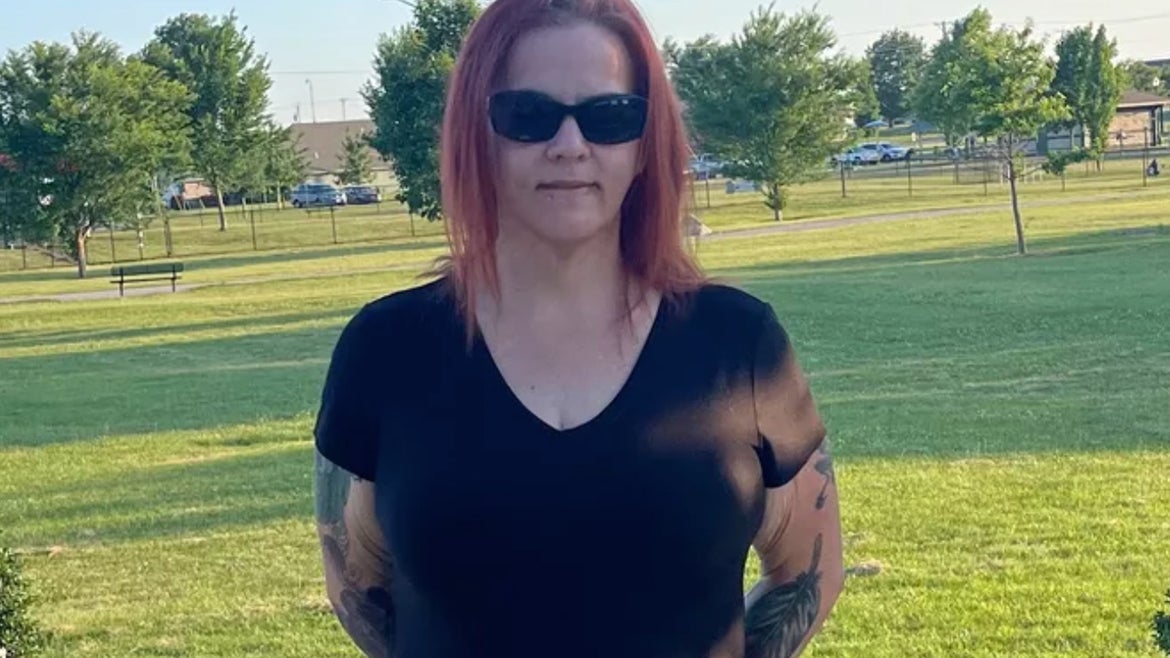After Mylissa Farmer said she was denied an abortion that she claims doctors confirmed was imperative to her health, the National Women’s Law Center filed a formal complaint with the Centers for Medicaid and Medicare Services, leading to an investigation.
Mylissa Farmer’s water broke just 17 weeks into her pregnancy this summer.
After rushing to the ER, the Missouri woman, 41, was told by doctors that she had experienced a premature rupture of membranes, resulting in bleeding, cramping, and pain, according to local outlet Springfield-News Leader.
Farmer and her boyfriend, Matthew McNeill, say they were told by the Freeman Hospital staff that at under 18 weeks, the fetus would not survive outside of the womb if she were to deliver, and due to a dilated cervix and a complete loss of amniotic fluid, continuing to carry also posed serious issues, per the outlet.
She says despite this, the hospital denied her need for treatment due to Missouri’s ban on abortion.
Michelle Banker, Farmer’s attorney and Director of Reproductive Rights and Health Litigation at the National Women’s Law Center (NWLC) told Inside Edition, "Although doctors had concluded that her pregnancy was no longer viable and that she was at risk of a serious infection, hemorrhaging, or even death, the legal department at that hospital overrode the doctors medical judgment and denied emergency care.”
After allegedly being refused emergency care at Freeman Hospital, Farmer says she sought care from University of Kansas Hospital, only to be denied again.
According to Springfield-News Leader, Freeman Hospital says it cannot comment on Farmer's case "because it is a patient privacy HIPAA issue, which is hospital policy."
According to the local outlet KHN, on Aug 6., Farmer was ultimately forced to travel across state lines to the Hope Clinic for Women in Illinois to receive the abortion that she says saved her life — four days after her water initially broke.
This incident occurred shortly after the Supreme Court’s ruling to overturn the Roe v. Wade decision, but federal law states that emergencies are meant to serve as an exception.
According to Banker, a federal law entitled the Emergency Medical Treatment and Labor Act (EMTALA) requires hospitals to provide care in the event of an emergency, and that includes abortion care that the state might [otherwise] deem to be illegal.
Banker told Inside Edition Digital that this 1986 law clearly states that visitors to the ER are meant to receive the care they need, and the Missouri abortion ban has an exception for emergencies.
Because of what NWLC believes was a blatant violation, they have filed a complaint against the Missouri hospital, resulting in an investigation led by the Department of Medicare and Medicaid Services — an agency with the Department of Health and Human Services.
“EMTALA has always required the provision of emergency abortion care for someone who's pregnant and is sent to the emergency department, and then the doctors determine the best care to treat patients,” Banker told Inside Edition Digital.
“After Roe vs. Wade was overturned, the Department of Health and Human Services issued guidance that made clear that EMTALA requires this care, so it was this guidance clarifying what the law already did,” she said.
Banker shared that while the administration recognizes and reaffirmed the protections that EMTALA provides, the guidance has been a subject of some litigation.
“In Texas now, there has been an injunction preventing the CMS from enforcing EMTALA in line with this guidance,” the attorney said.
Texas has filed a complaint challenging the guidance, and the federal government has said that they are currently unable to enforce the guidance in this specific state because of the current lawsuit.
“But for the rest of the country, the guidance is still enforceable and it is quite clear that the care should have been provided to our client, irrespective of Missouri law,” Banker said.
Banker said that after hearing about an alleged denial of services, the Missouri Department of Health and Senior Services opened an EMTALA investigation at Freeman Hospital West, authorized by the federal Centers for Medicare & Medicaid Services (CMS).
According to the attorney, this initial investigation by the state of Missouri was not prompted by Farmer.
Banker said that under normal circumstances, EMTALA investigations are usually a matter to be investigated by the state health departments.
But, because the Missouri State Department of Health is partially responsible for enforcing the state’s abortion ban, the state agency leading this charge gave NWLC pause.
“And, because the state has a record and demonstrated history of hostility towards abortion, we have some serious concerns with these sorts of investigations being conducted by state of Missouri, which is why we filed the complaint directly with the CMS, and asked them to do an independent investigation,” she said.
The director told Inside Edition that her team feels positive about the outcome of the investigation. “We’re encouraged and confident that the agency will find a violation here,” Banker said.
Farmer, who has created a GoFundMe to help finance a move out of Missouri, hopes her experience, and the attention it is receiving, will save others from going through something similar.
“Ms. Farmer has told us from day one that she just does not want what happened to her to happen to anyone else, ever,” Banker said.
“Our hope is that the federal government taking decisive action to enforce EMTALA will set the precedent for not just Missouri hospitals but hospitals across the country.
“But irrespective of state laws, these hospitals must comply with EMTALA and must provide people who are experiencing emergency pregnancy complications with the emergency abortion care that they need.”






